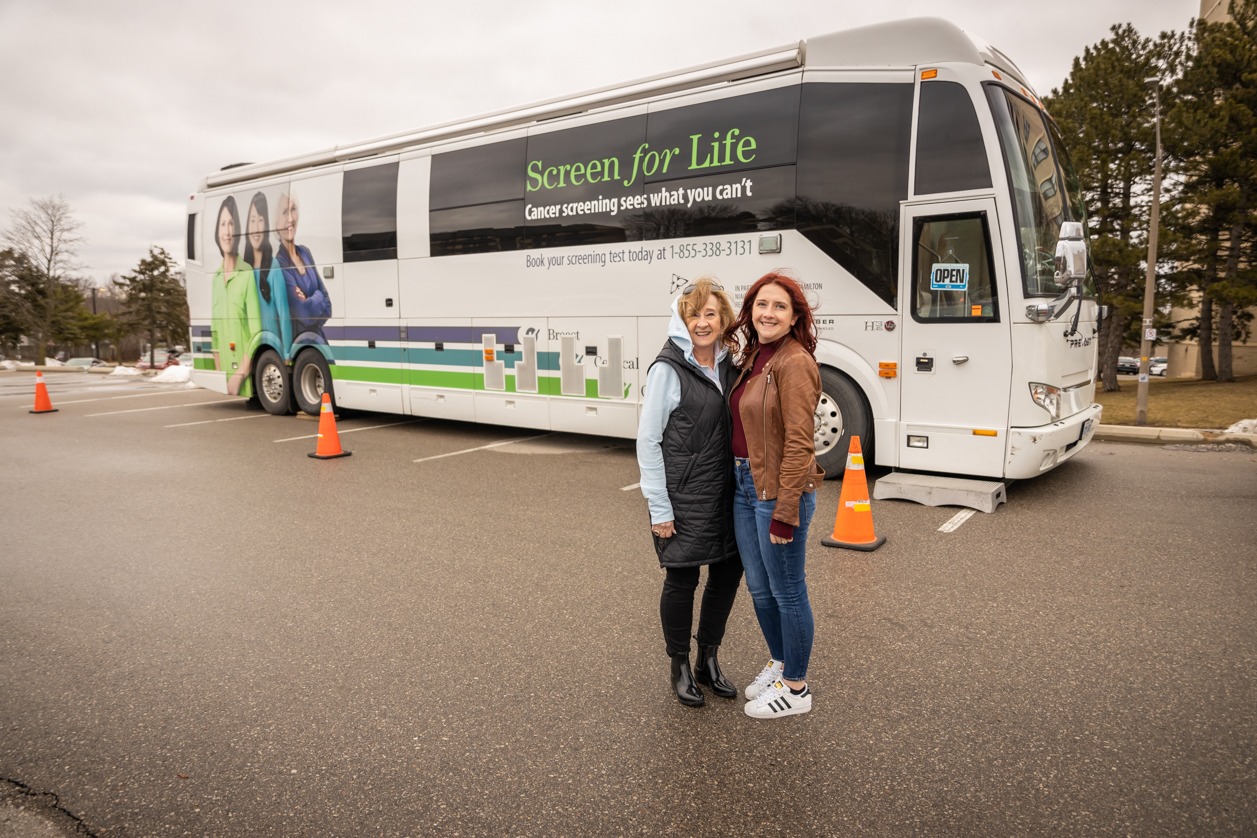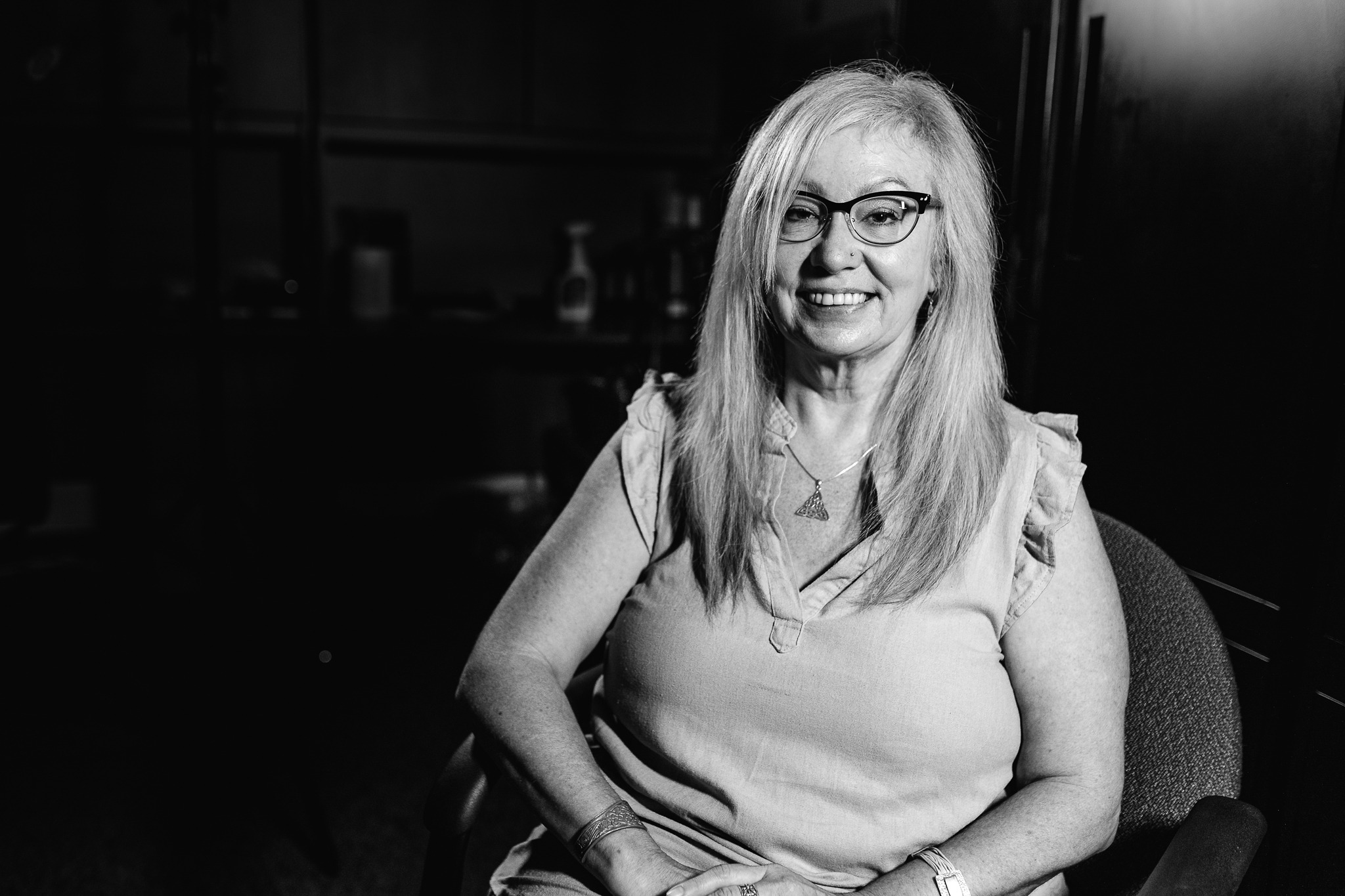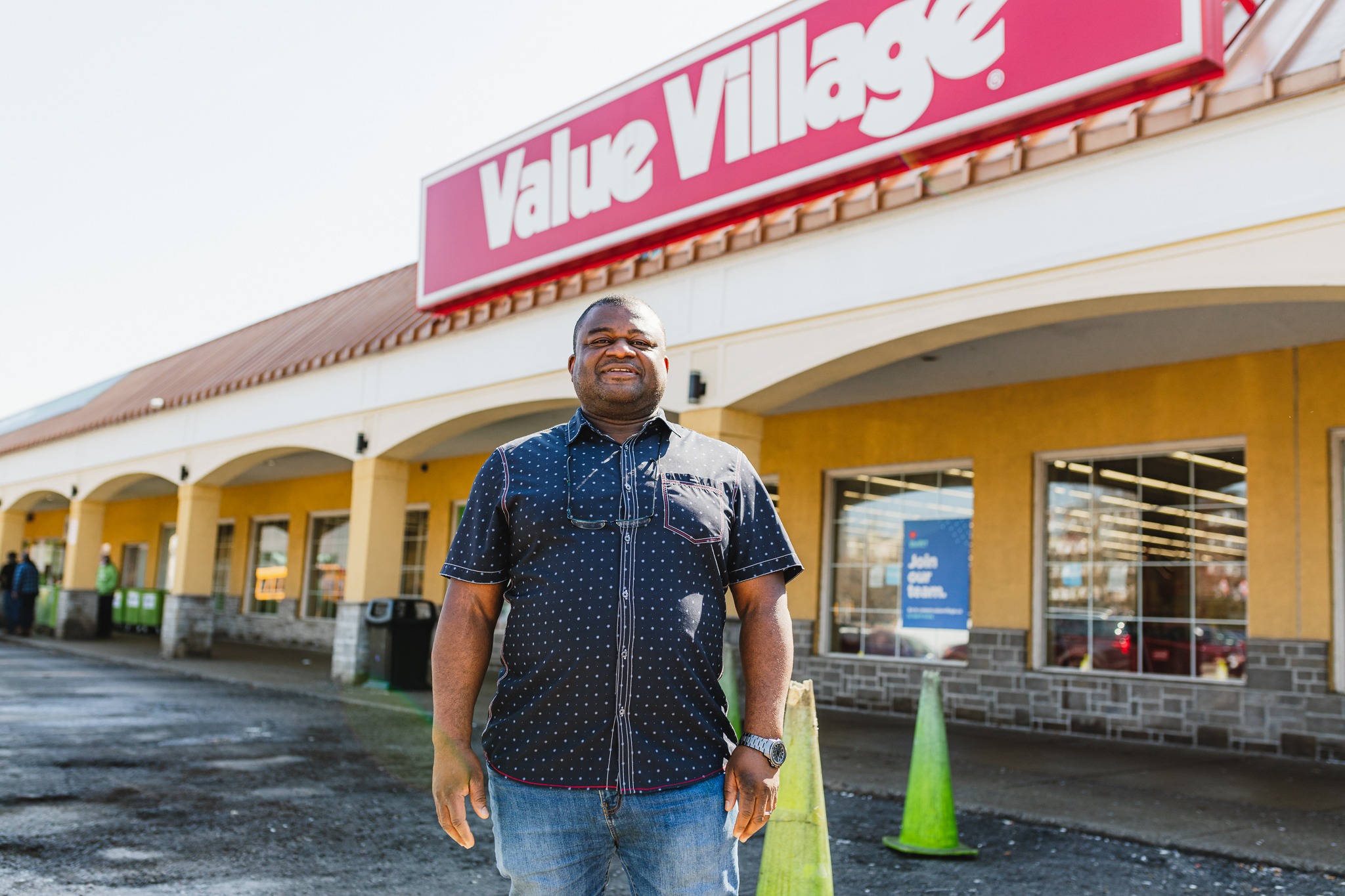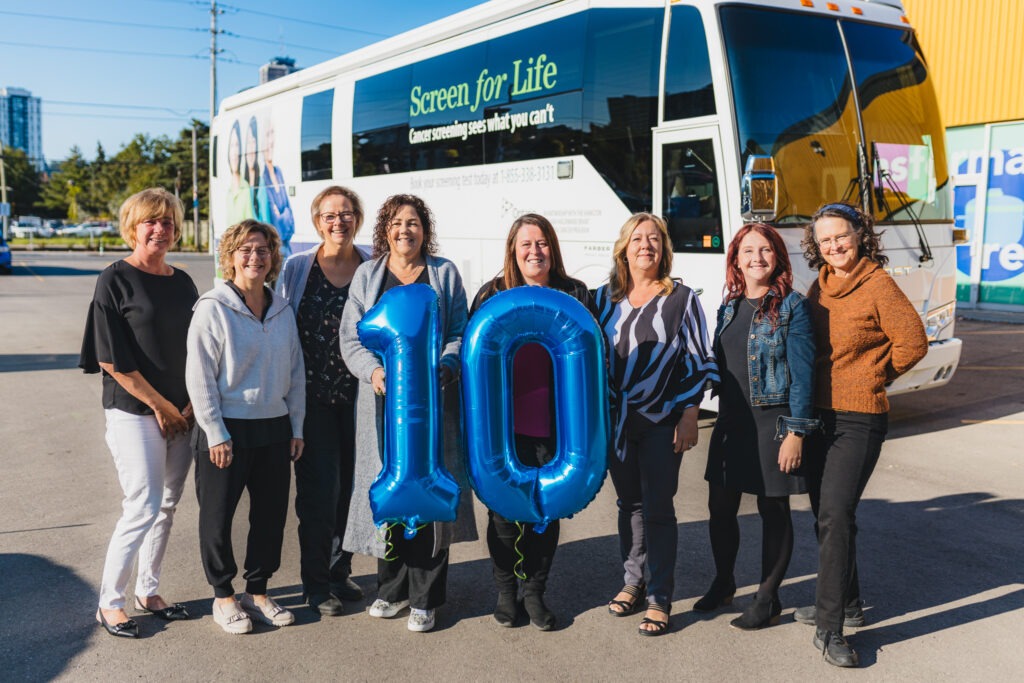
Mobile Cancer Screening Coach celebrates 10 years on the road
This fall marks the 10-year anniversary of the Mobile Cancer Screening Coach, a unique cancer screening program offered on a 45-foot-long coach bus that travels the region providing free cancer screening tests and support to quit smoking in communities with low cancer screening rates.
When the program launched in 2013, the coach visited three communities in Hamilton. Since then its route has expanded significantly, with visits to more than 60 locations across the region including Hamilton, Six Nations of the Grand River, Mississaugas of the Credit First Nation, and several Niagara communities.
The program has been widely lauded for its success in supporting health equity, where everyone has a fair chance to live their healthiest lives. Since its launch, the program has provided 10,153 cancer screening tests, with 5,854 people receiving mammograms, 3,250 people getting Pap tests and 3,635 people receiving an at-home test that screens for signs of colorectal cancer.

Neil Johnson, vice president of oncology for HHS and regional vice president for the Hamilton Niagara Haldimand Brant Cancer program, Ontario Health – Cancer Care Ontario.
“Ten years of providing mobile cancer screening is a milestone worth celebrating,” says Neil Johnson, vice president of oncology for Hamilton Health Sciences (HHS) and regional vice president for the Hamilton Niagara Haldimand Brant Cancer program, Ontario Health – Cancer Care Ontario.
“A lack of equity is one of the most significant issues impeding positive health care outcomes today,” says Johnson. “By visiting communities with low screening rates, the coach team helps to break down barriers many people face in getting screened for cancer or finding help to quit smoking.”
Mobile cancer screening
The mobile coach is staffed by an HHS registered nurse, mammography technologist and receptionist, and partners with community organizations located in areas with low screening rates, to provide on-site cancer screening tests through the province’s Ontario Breast Screening Program, Ontario Cervical Screening Program and ColonCancerCheck program. All three tests are provided free by the province to help catch cancer early, when it’s easier to treat.
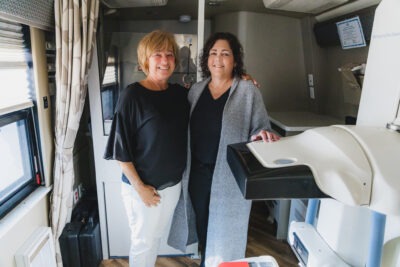
Mammography technologists Carrie Claxton and Leslea Boyle in the coach’s mammography suite.
The coach is equipped with a state-of-the-art digital mammography room for breast screening, as well as a private exam room for the nurse to ask health-related questions, perform Pap tests and order colorectal cancer screening kits that are mailed to clients’ homes.
The coach program recently began offering nicotine replacement therapy (NRT) in partnership with Hamilton Public Health, to support people who want to quit smoking.
Anyone over the age of 18 can speak to the coach nurse about getting a two-to-four week supply of NRT. Visitors can drop by the coach at their convenience or book an appointment in advance.
Health care equity, on wheels
Many people face more than one barrier to screening, which can include a lack of transportation to visit a mammography site or their family doctor, or having no family doctor.
There could be language or cultural barriers, which the coach helps overcome through its translation services and staff cultural training. Other barriers can include a lack of trust in the health-care system, isolation, homelessness, mobility challenges or a work schedule that makes it difficult to seek health care during the week.
Early days
Compass Community Health in north Hamilton was among the first community partners to host the coach in its parking lot 10 years ago.
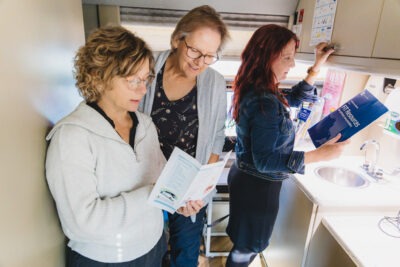
Registered nurses Kathi Potter, Ingrid St. Pierre and Megan Welch provide Pap tests, connect patients with colon cancer screening tests, and provide support for quitting smoking.
“The mobile coach’s team members have done a lot of work over the years forging relationships with our staff, health-care providers and community members to get the word out about cancer screening,” says Kathy Allan-Fleet, Compass’ chief executive officer.
“Our vision at Compass Community Health is, `no obstacles to health.’ We definitely see the partnership with the coach as one more way to reduce barriers to accessing health-care services, and in a very special and unique way. It has been a wonderful relationship.”
Program expansion
In December 2014, the coach program expanded to Six Nations of the Grand River, followed by Mississaugas of the Credit First Nation.

Debra Jonathan, Indigenous cancer lead for the Hamilton Niagara Haldimand Brant Regional Cancer Program
“We decided that more needed to be done to combat cancer among Indigenous people, including promoting cancer screening tests that check for signs of breast, cervical and colon cancer,” says Debra Jonathan, who 10 years ago was the nurse in charge at Gané Yohs Community Health Centre in Six Nations of the Grand River. Jonathan is now the Regional Cancer Program’s Indigenous cancer lead.
“The coach has become a staple here,” says Jonathan, who, along with other Indigenous health care providers, worked with the Regional Cancer Program to bring the coach program to the Indigenous community.
In 2019, when the province announced that funding for the coach was being re-directed and the service would no longer be offered, the Indigenous community was among the program’s strongest champions, urging the province to reconsider.
“I’ll never forget the day we found out that the province had reversed its decision and the coach program would continue,” says Jonathan. “Staff at the health centre could be heard celebrating the news that the coach was staying. It was such a relief.”
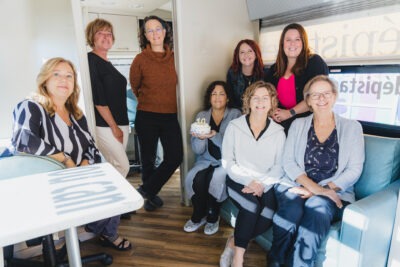
The coach includes a comfortable reception area.
Expansion continued into the Niagara communities of St. Catharines, Niagara Falls, Port Colborne, Fort Erie, and most recently, Welland. In Port Colborne and Fort Erie, coach visits helped fill a gap left by the closure of the Ontario Breast Screening Program in that community due to outdated equipment.
“The mobile coach is essential for these communities,” says Taralea McLean, executive director of Bridges Community Health Centre, serving communities including Port Colborne and Fort Erie.
“Transportation to get to the OBSP in Welland or Niagara Falls can be a challenge for many people living in Port Colborne and Fort Erie. Having the mobile coach visit our sites at least once a month provides potentially life-saving cancer screening that some individuals might not otherwise be able to access.”
A caring, dedicated team

Dr. Meghan Davis, medical lead
Dr. Meghan Davis is the coach program’s medical lead and she has high praise for its team. “Their focus on patient care is amazing,” says Davis.
“They consider every detail, from finding parking in locations that are accessible, to working to become a trusted member of many local communities, to providing translation services that address language barriers. The coach team also carefully follows up test results with clients and most importantly, always provides kind, caring and thorough clinical care to everyone who visits.”
Milestones and highlights
September 2013 –The provincially-funded coach program launches, with regular visits to three lower Hamilton neighbourhoods. There’s only one other cancer screening bus in the province, based at the Thunder Bay Regional Health Sciences Centre, and serving northwestern Ontario.
December 2014 – The coach expands services to include Six Nations of the Grand River.
May 2015 – The coach team receives the Human Touch Award from Cancer Care Ontario, recognizing exemplary and compassionate patient care by people who work or volunteer in the cancer care system.
October 2016 – The coach program receives Honour Roll status for the 2016 Minister’s Medal, for excellence in health quality and safety, in recognition of excellent work by health-care providers across the province.
January 2017 – The coach rolls out a workplace program, offering on-site screening at workplaces, to any employees who may experience barriers to getting screened. Workplaces include over 10 long-term care homes to screen employees, as well as Stelco and other companies.
October, 2017-2018 – The coach program begins expansion into Niagara, providing service to St. Catharines, Niagara Falls, Port Colborne and Fort Erie.
July 2019 – The province announces that funding for the coach is being re-directed, and the service will no longer be offered. Hamilton Health Sciences Foundation provides funding to keep the coach program running until the end of the fiscal year. As a result of an evaluation and support from community members and organizations, including the Indigenous community, the coach secures funding to keep operating.
March 2020 – This is the last day of operations before closing periodically due to the COVID-19 pandemic.
March 2022 – The coach program works to aid in the recovery of cancer screening rates across the region, quadrupling the number of Pap tests performed on the bus prior to the pandemic.
Take a virtual tour of the coach, and check out its schedule, including booking information.

